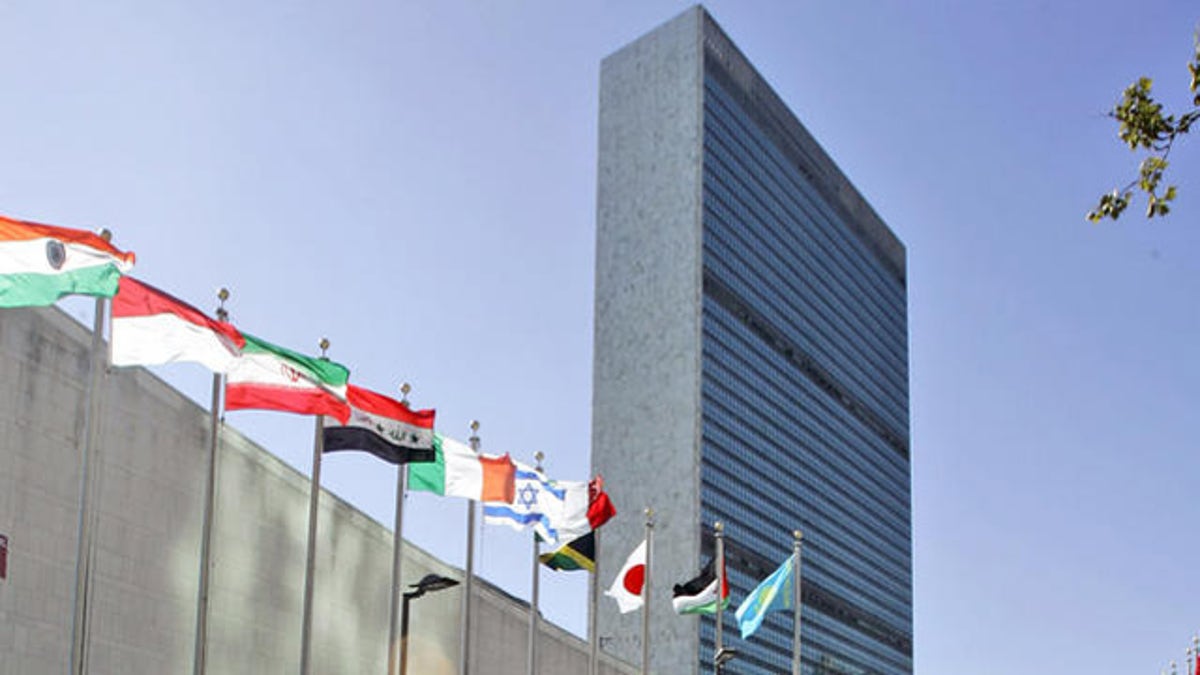
The United Nations hopes to build a second building in New York that could rise as high as its landmark Secretariat building. (AP)
The United Nations, which is already spending $1.9 billion to renovate its New York headquarters, hopes to build a second high-rise nearby on two-thirds of an acre that is currently used as a city playground.
The new building, which could be as much as 900,000 square feet in area, could rise as high as the U.N.’s landmark Secretariat building, and according to a New York City real estate expert consulted by Fox News, could cost anywhere from $370 to $475 million—excluding land costs. Those figures do not include any additional costs for security features, which could hike the total much higher.
The proposed addition to the U.N. headquarters could also pose extensive new security concerns for the U.N. and for New York City. Only last February, the U.S. government agreed to foot the bill for $100 million in security improvements to the current U.N. headquarters campus, after city officials expressed intense behind-the-scenes frustration at the vulnerabilities of the existing U.N. complex.
The property transfer deal that would make the new construction possible has been tried before, and failed. In 2005, a similar proposal was voted down by the New York State Legislature, in the face of widespread local opposition, in part stirred up by the U.N.’s perceived anti-Israel stance.
That same perception could reach a new crescendo this September, when the world organization sponsors the so-called Durban III anti-racism conference in New York City. The conference harks back to the original U.N. sponsored conference in Durban, South Africa, in 2001, which produced a resolution equating Zionism with racism.
The Obama Administration has already declared that it will not take part in the upcoming Durban III, even though the U.S. is the host country, in recognition of the conference’s ugly legacy.
This time around, the opposition to the U.N. land swap seems milder. A new version of the proposed land transfer was voted through both houses of the New York legislature and currently awaits signature by New York State Governor Andrew Cuomo.
But that legislation would not necessarily make the property transfer a done deal. It must still await negotiations between New York City and the state government over a framework to complete a package of land swaps and property divestitures that would give the city an expanded strip of park space along Manhattan’s East River, which the administration of Mayor Michael Bloomberg considers a legacy issue.
The city and state have until October 10 to create a legal instrument that would give a go-ahead to the deal, which the Bloomberg Administration wants to emphasize as a land-for park-space arrangement.
“We have a framework for negotiations over the next several months that could well result in an outstanding green way for the City of New York,” says Micah Lasher, the Bloomberg administration’s director of state legislative affairs.
For its part, the United Nations is lying low. A spokesman for U.N. Secretary General Ban Ki-moon’s office told Fox News that the world organization has been “kept informed” of the land-swap process, it “has not been involved in any planning to date.”
“If the city and state successfully complete [their negotiated understanding], we will determine how the U.N. will then proceed.”
The U.N.’s under-the-radar diffidence is perhaps understandable, given previous controversy over its hugely expensive renovation—which ballooned from an initial estimate of around $600 million to the current $1.9 billion—even before security costs were added in.
Moreover, any new building would not be owned by the U.N. itself, but would be held by the United Nations Development Corporation (UNDC), a public New York state corporation that was created in 1968 to help the U.N. with its real estate expansion off the original U.N. campus.
UNDC hopes to make additional money out of the deal because the U.N. is already the main tenant in two office towers across from the headquarters campus where the world organization rents space for only about 50 per cent—or less-- of current market rates.
If those U.N. staffers move to new quarters, the development corporation can make more money with new tenants or dispose of the buildings, as the New York state legislation puts it, “by sale or otherwise.”
UNDC, however, deflected all questions from Fox News about the new development back to the Bloomberg Administration.
None of the parties to the proposed deal was eager to talk about the security implications of any new U.N. occupied building on the small rectangle of parkland south of Manhattan’s 42nd Street that is the intended site.
According to the bills passed by New York state’s assembly and senate, the property extends to a depth of only a smidgeon more than 146 feet from Manhattan’s First Avenue. That means any new building there would be much closer to the street than the main Secretariat building, and correspondingly more vulnerable to terrorist assault.
One of the main legislative supporters of the land swap, however, argues that it will “actually diminish the security concerns we have.”
Brian Kavanagh, a Democratic state legislator who represents the Manhattan east side district that surrounds the U.N., argues that “currently you have a situation where U.N. functions are spread in buildings throughout the city. Some of these are probably easier targets than they would probably be right here on the U.N. campus.”
The U.N. declined to answer any questions from Fox News about security issues. But those are certain to arise when—and if—the land swap deal reaches its next green-light phase in October.
George Russell is executive editor of Fox News and can be found on Twitter@GeorgeRussell. David Lee Miller and Ben Evansky contributed to this report
